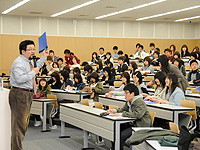School of Letters
Prepare for the future with the School of Letters
While many people imagine the School of Letters as students studying at a desk, we in fact offer some of the most interactive classes on campus. Our educational philosophy allows students to gain first-hand experiences through experiential learning. In addition to fostering students’ interest in various academic fields, we also incorporate contemporary subjects that are relevant to current events (with special subjects that underclassmen have access to early on in their academic career). The School of Letters continues to move forward and respond to students’ desire not only to “learn”, but discover the “benefits of learning”.
Department of Japanese Literature and Culture
Enhance your intelligence, sensibility, and creativity by studying Japanese literature and culture
The Department of Japanese Literature and Culture offers a curriculum with numerous elective courses that students can choose according to their interest. The courses include classical and modern literature, traditional culture, theater, movies, and animation. The department also offers creative instruction by active authors, editorial instruction by experienced publishers, and theoretical instruction in the traditional art of Japanese calligraphy (shodo). Faculty in this department support each student by helping them find research topics and develop their research while broadening their understanding of Japanese literature and culture.
Department of English
Improve your English language skills as you deepen your understanding of various cultures
In order to truly acquire English proficiency, students must deepen their understanding of different cultures. With this in mind, the Department of English is supported by highly experienced faculty who cover a wide range of English-related subjects, including studies of British and American literature and culture, linguistics, and English language pedagogy. Students are not just limited to studying classical literary works, but provided opportunities to learn from journalism, movies, musicals, animations, and pop culture. As a result, students can develop their English language skills and gain expertise in communicating cross-culturally. Along with a wide range of lectures and exercises, students also actively participate in practical classes that cover interpreting and translating. Our curriculum is even structured so that students can exchange credits if they participate in mid-term study abroad for half a year or even long-term study abroad for up to one year. This department encourages students to study abroad, put their English skills to the test, and learn to be accepting of different cultural values.
Department of Philosophy
Understanding philosophy is the gateway to understanding art, religion, and society
The Department of Philosophy offers a large number of lectures that cover both western and eastern philosophy (particularly that of India, China, and Japan) as well as other cultural aspects such as art, religion, and society in general. Our curriculum is organized so that students not only study areas of interest, but discover new interests along the way. Each course is designed with subject matters meant to surprise and encourage students to shape their own philosophical understanding of the world. Students in this department have the unique opportunity of learning how to accurately express themselves through thought-provoking discussions among small groups. With seminars that offer an intimate setting for students to expound on their ideas, students will gain the ability to think more deeply and manifest those thoughts into action.
Department of History
Gain wisdom and a broader perspective by learning how history and modernity are connected
When studying history, it’s important to think about who, what, where, when, and why. Our curriculum enables students to answer these questions by taking a broader view of history. By understanding the international relations, as well as the cause and effect of events from one era to the other, students begin to understand how history directly impacts them in the modern age. Many exciting experiences await those who wish to interact with cultures of the past, for those who do will gain the wisdom of today.
Department of Geography
Learn practical skills by solving real world problems through effective fieldwork
The Department of Geography begins by having students investigate issues concerning a specific region, and upon doing so, applying their newly-gained knowledge to find solutions. Our curriculum facilitates students to learn about a variety of contemporary issues, ranging from the phenomena of rapidly heating islands to deforestation, abnormal weather patterns, natural disasters, urban overcrowding, rural depopulation, and the destruction of culturally rich landscapes. With an emphasis on fieldwork, students have the opportunity to observe the world we inhabit up-close and discover effective means for solving current environmental and social issues.
Department of Journalism
Learn how to identify and transmit factual information that replenishes the media with truth
As internationalization and computerization continue to advance, our societies have become flooded with a wide variety of information. As of 2019, the newly restructured Department of Journalism tackles this issue by empowering students to more deeply understand the realities of the world, their local community, and global media in order to find the truth and express their opinions. Our curriculum covers both the theories and practices that make up media and media production. By engaging in fieldwork and learning how to extensively dig for information, students gain the ability to glean truth from copious amounts of information. With such knowledge and abilities, students can go on to apply their unique creativity and critical thinking skills to become specialists in any field they choose.
